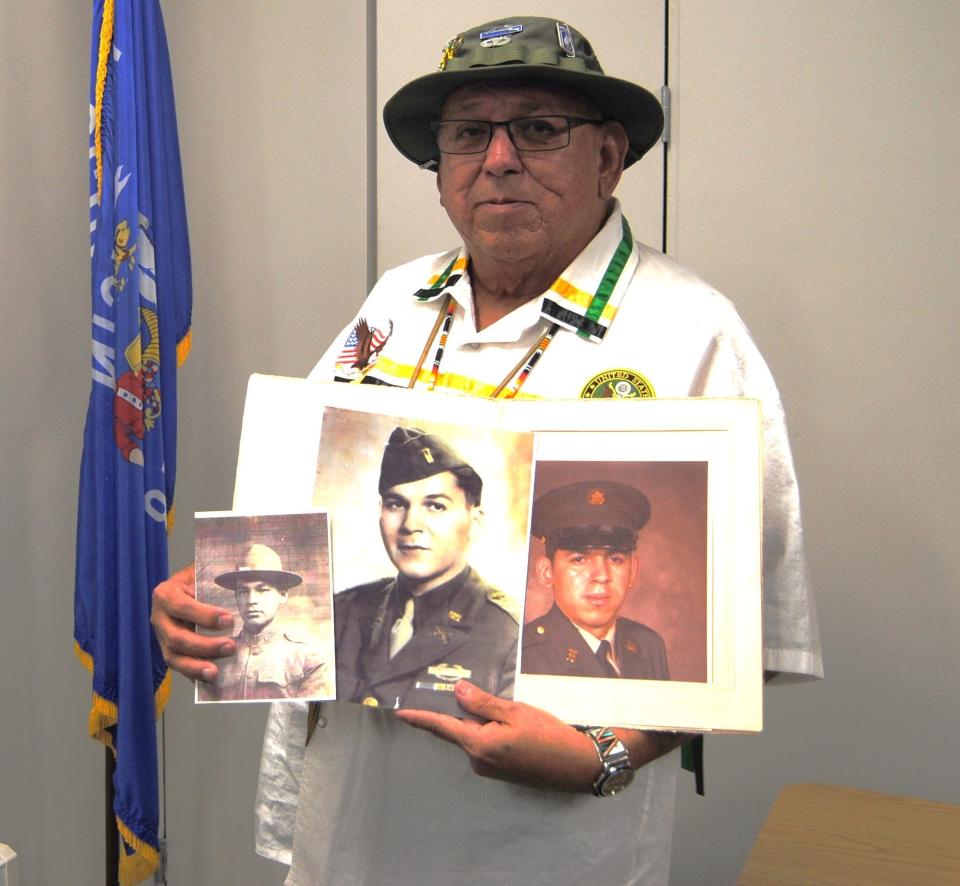Native Americans have proud tradition of serving in military. This Oneida Vietnam War veteran explains why.
MANITOWOC – Dan King refused to take off his uniform when returning home from the Vietnam War, like so many other veterans did at that time.
“I earned this uniform,” he told a crowd of a few dozen people during a recent speaking event at the Wisconsin Maritime Museum.
King had heard stories from his comrades about how they were abused coming home, spit on and even assaulted because of the antiwar sentiment at the time.
When he returned home from his first tour, he had to wait nearly two hours for a taxi at O’Hare International Airport in Chicago and he suspected it was because he had his uniform on.

King also faced taunts, such as being called “baby killer.”
But when he finally arrived home at the Oneida Reservation near Green Bay, it was a much different story.
King is a member of the Oneida Nation whose father had served in World War II and whose grandfather had served in World War I.
For many Indigenous communities, including Oneida, a veteran is someone to be respected and honored. No matter what someone’s politics may be, many tribal people celebrate those members who have served.
More: Native American veterans who are homeless get lift from Oneida Nation program
King was treated to a feast and drinks when he arrived home.
“I was respected in Oneida,” he said. “That’s more than any other guy I knew (outside tribal communities) got.”
Native Americans serve in the military at one of the highest rates of all demographics, second only to Native Hawaiians and other Pacific Islanders, according to a report from the Department of Veterans Affairs.
The Oneida, for example, have served in every major U.S. conflict since the Revolutionary War.
King said one of the most common questions non-Natives ask him is why Native Americans serve at the highest rates for a country that disposed them of their land and treated them poorly for hundreds of years.
“It’s simple,” he said. “We lost the land once and we’re not going to do it again.”
King said Native Americans are taught since childhood to protect Turtle Island (North America).
The VA report also notes that more than 90% of the 42,000 Native Americans who served during the Vietnam War had volunteered even when the draft was in effect and serve disproportionately in some of the most dangerous positions, such as “point man” and scouts.
King served point for the Army.
“Just about every guy I met who was Native had to walk point,” he said.
King said officers thought of Native Americans as warriors who could handle the most dangerous positions.
More: Native American veterans memorial aims to bring centuries of untold service into the light
He said that kind of thinking is flawed because he received the same training as everyone else.
“I had been shot,” King said. “I bleed red. The bullet didn’t stop. I’m like everyone else. You think we know how to fight because of the movies.”
In the end, though, King said it was all about protecting each other. He recalled times when he could’ve been killed for taking risks, but it was worth it to save someone’s life.
King said war isn't glorious — it’s horrific — and he didn’t want the medals that were awarded to him.
“Who goes to die for a flag or country?” he said. “All the guys on the (Vietnam Memorial) Wall didn’t die for a flag. They died for somebody like me, buddies. They died looking out for each other.”
Frank Vaisvilas is a former Report for America corps member who covers Native American issues in Wisconsin based at the Milwaukee Journal Sentinel. Contact him at fvaisvilas@gannett.com or 815-260-2262. Follow him on Twitter at @vaisvilas_frank.
This article originally appeared on Milwaukee Journal Sentinel: Oneida veteran explains Native Americans' history of military service

